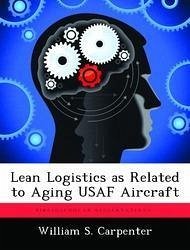The United States in its global war on terrorism (GWOT) has virtually opened the floodgates on wartime spending resulting in aircraft that directly support the GWOT receiving more funding to maintain their operability or mission capability. Such aircraft are identified using specific project codes that identify the aircraft as directly supporting the war efforts. Examples include, but are not limited to the KC-135 Stratotanker and the C-5 Galaxy. Both the Stratotanker and Galaxy (C-5A model) are among the oldest aircraft in the USAF inventory. At some point however, GWOT funding will be reduced and project codes removed as the USAF reverts back to the budgetary limitations prior to September 2001. It is the author's belief that the use of project codes have over compensated for lean logistics processes providing USAF leaders with a false sense that current lean logistics processes work for aging aircraft systems.








